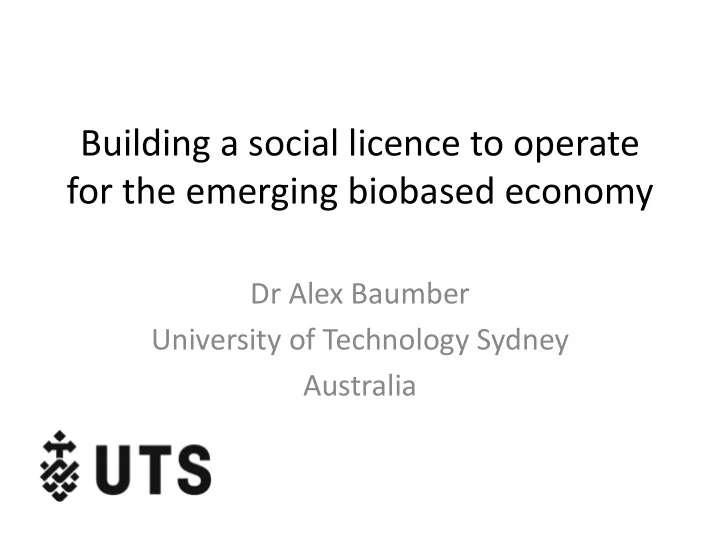

Building a social licence to operate for the emerging biobased economy Dr Alex Baumber University of Technology Sydney Australia
http://www.oilmallee.org.au
Social Licence to Operate (SLO) SLO “must begin with, and be firmly grounded in, the social acceptance of the resource development by local communities” (Joyce & Thomson 2000) SLO is “dynamic and nonpermanent because beliefs, opinions, and perceptions are subject to change as new information is acquired” (Thomson and Boutilier 2011)
Social licence Social licence: and systems thinking retained altered lost State 1: “Under the radar” (social licence yet Resilience of to be gained or social licence State 2: lost) Social licence held
What can SLO offer for understanding the social acceptance of emerging bio-based industries? 1. Key variables – especially the role of trust Trust-building: - Quality of contact > quantity (Dare et al. 2014) - Keeping small promises (Thomsen & Boutilier 2011) - Responding to disturbance in community’s interest 2. Methods: Quantitative - surveys used to assign values to variables Qualitative – asking people if social licence exists
Thomson & Boutilier (2011) SLO frameworks Zhang et al. (2015) Dare et al. (2014) and variables – wind energy Prno (2013) Hall (2014) - forestry - mining - mining - mining Benefits and costs ✔ ✔ ✔ - How are they distributed? Processes ✔ ✔ ✔ ✔ - Communication & engagement Governance ✔ ✔ - Decision-making power Trust ✔ ✔ ✔ ✔ ✔ - Credibility, legitimacy Adaptability ✔ ✔ - Flexibility, responsiveness
Role of trust SLO studies (6) Non-SLO studies (27) 100% 80% 60% 40% 20% 0% Distribu0on of Procedural Trust Adaptability benefits and costs fairness Baumber 2018. Social licence and energy cropping: What’s trust got to do with it? Biomass and Bioenergy 108 : 25-34
What can SLO offer for understanding the social acceptance of emerging bio-based industries? 1. Key variables – especially the role of trust - Trust in existing institutions/companies (e.g. forestry) - Quality of contact > quantity (Dare et al. 2014) - Keeping small promises (Thomsen & Boutilier 2011) - Responding to disturbance in community’s interest 2. Methods: Quantitative - surveys used to assign values to variables Qualitative – asking people if social licence exists
Zhang et al. (2015)
What can SLO offer for understanding the social acceptance of emerging bio-based industries? 1. Key variables – especially the role of trust - Trust in existing institutions/companies (e.g. forestry) - Quality of contact > quantity (Dare et al. 2014) - Keeping small promises (Thomsen & Boutilier 2011) - Responding to disturbance in community’s interest 2. Methods: Quantitative - surveys used to assign values to variables Qualitative – asking people if social licence exists ‘‘That license is there’’ ‘‘All but a handful of people support it” (Prno & Slocombe 2014)
What can studies of emerging bio-based industries offer to the SLO concept? 1. Different types of costs/trade-offs: - Food security issue - Landscape amenity 2. Different types of benefits: - Carbon-neutral (or carbon positive through sequestration) - Ecosystem services (soils, biodiversity, water quality) 3. Different relationships: - impacts of land use change vs building facilities - threshold for community concern based on industry size
Dockerty et al. (2012)
What can studies of emerging bio-based industries offer to the SLO concept? 1. Different types of costs/trade-offs: - Food security issue - Landscape amenity 2. Different types of benefits: - Carbon-neutral (or carbon positive through sequestration) - Ecosystem services (soils, biodiversity, water quality) 3. Different relationships: - impacts of land use change vs building facilities - threshold for community concern based on industry size
Yu et al. (2007) – WA Simpson et al. (2009) - Europe
What can studies of emerging bio-based industries offer to the SLO concept? 1. Different types of costs/trade-offs: - Food security issue - Landscape amenity 2. Different types of benefits: - Carbon-neutral (or carbon positive through sequestration) - Ecosystem services (soils, biodiversity, water quality) 3. Thresholds for SLO to be considered: - land use change vs new facilities 4. Determinants of trust: - no single “proponent” in gradual land use change - companies switching from forest products to energy
References Dare, M., Schirmer, J. & Vanclay, F. Community engagement and social licence to operate. Impact Assessment and Project Appraisal 2014; 32: 188-197. Dockerty, T., Appleton, K. & Lovett, A. Public opinion on energy crops in the landscape: considerations for the expansion of renewable energy from biomass. Journal of Environmental Planning and Management 2012; 55: 2234-1158. Hall, N. L. Can the “Social Licence to Operate” Concept Enhance Engagement and Increase Acceptance of Renewable Energy? A Case Study of Wind Farms in Australia. Social Epistemology 2014; 28: 219- 238. Joyce, S. & Thomson, I. Earning a social licence to operate: social acceptability and resource development in Latin America. Canadian Mining and Metallurgical Bulletin 2000; 93: 49-53. Prno, J. & Slocombe, D. A Systems-Based Conceptual Framework for Assessing the Determinants of a Social License to Operate in the Mining Industry. Environmental Management 2014; 53: 672-689. Simpson, J., G. Picchi, A.M. Gordon, N.V. Thevathasan, J. Stanturf, I. Nicholas, Short Rotation Crops for Bioenergy Systems: Environmental Benefits Associated with Short-Rotation Woody Crops, IEA Bioenergy, Task 30, 2009, p. 24. Thomson, I. & Boutilier, R. The social license to operate. In: Darling, P. editors. SME mining engineering handbook (3rd ed.). Englewood: Society for Mining, Metallurgy, and Exploration; 2011. pp. 1779-1796. Yu,, Y. J. Bartle, H. Wu, Modelling mallee biomass supply in Western Australia, Bioenergy Australia Annual Conference, Curtin University of Technology and Department of Environment and Conservation, Gold Coast, 2007. Zhang, A., Moffat, K., Lacey, J., Wang, J., González, R., Uribe, K., Cui, L. & Dai, Y. Understanding the social licence to operate of mining at the national scale: a comparative study of Australia, China and Chile. Journal of Cleaner Production 2015; 108, Part A: 1063-1072.
Further info Baumber 2018. Social licence and energy cropping: What’s trust got to do with it? Biomass and Bioenergy 108 : 25-34
Recommend
More recommend